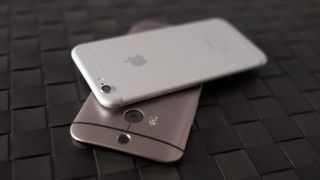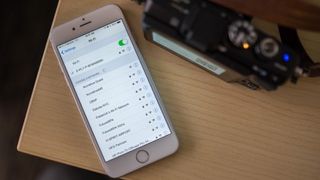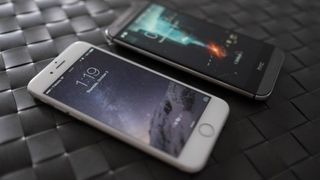Life through the smartphone lens

My biggest personal gripe with Android wasn't with the mobile OS itself, but the HTC One M8's camera. In April our Mobile Editor, Marc Flores wrote that the HTC flagship has more than enough resolution to take great pictures. While I agree with Marc - that deliberate and well-planned shots can make the camera sing - it's terrible for taking quick snapshots, which is really what the majority of smartphone shooters actually care about.
It's a perfectly serviceable camera even with just 4MP and it works exceptionally well in low-light situations. However, add in even the slightest hint of bright lighting into the scene and the camera's dreadful dynamic range rears its ugly, ethereal face. Bright sections of the frame completely blow out the image, causing it to take on a soft focus with cloudy aesthetics.

The HTC One M8 isn't the only Android device with a bad camera. The Nexus 5 has had its share of problems, and Android cameras in general still range from just plain OK to good. Meanwhile, Apple kills it when it comes to great smartphone photography.
Although Apple continues to use an 8MP sensor while Samsung is blazing trails with 16MP technology, images out of the iPhone look remarkably better thanks to more refined image processing. Apple has made its platform even more appealing for serious iPhoneographers by adding system-level post-processing tools that eliminate the need to launch additional third-party apps.
Connecting other devices

If there's one thing Android is clearly better at, it's being a platform for other devices to connect to. With my HTC One M8, I could easily connect to anything whether it was a smartwatch or Wi-Fi enabled mirrorless camera.
This wasn't so with the iPhone 6. It was a much more annoying and convoluted process to pair everything with my Apple handset. For example, every time I wanted to quickly transfer an image from my Fujifilm X-T1, I had to activate the wireless on my camera, go to my phone's wireless settings, select the camera's ad-hoc Wi-Fi network and then finally activate the appropriate app. This same process on Android boils down to simply starting the app on the smartphone and hitting the camera's Wi-Fi button.
The same could be said about my Basis Carbon Steel Smartwatch. On Android, my smartwatch would re-sync every hour like clockwork. The wearable was even able to automatically re-pair itself with my smartphone after my smartwatch completely ran out of charge. In order to sync my fitness data to my new iPhone 6, I had to manually hit the re-sync button on the Basis. I also had to re-pair the devices together in case I reset either the smartwatch or Apple handset.
Get daily insight, inspiration and deals in your inbox
Get the hottest deals available in your inbox plus news, reviews, opinion, analysis and more from the TechRadar team.
Google has invested heavily into developing its own Android Wear platform for wearables making Android the better platform for device connection, where it seems like Apple will continue to lag further behind.
Since the search company also acquired Nest earlier this January, Google's interest in developing a completely smartphone-connected household also looks likely.
Aside from the Apple Watch, and the Air Display-connected Apple TV, Cupertino feels light years behind Google in this regard.
The road ahead

This experience has merely been a glimpse into the differences between iOS 8 and Android KitKat where both platforms have their strengths and pitfalls. The mobile landscape has changed drastically over the last few years and mobile operating systems - either iOS, Android and even Windows Phone 8.1 - have all matured with every iteration.
iOS 8 opens up the platform to better photography, activity tracker support and the Apple Watch. Google has yet to unveil Android L, but it's poised to finally give the mobile OS a major graphical overhaul as Apple did with iOS 7, lock screen notifications as well as a host of improvements to increase battery life and performance.
Ultimately the combination of better camera features and more apps lured me back to iOS and for the time being, that's where I'll stay.
- In another iOS versus Android fight we pit the iPhone 6 Plus against the Samsung Galaxy Note 4 in a clash of titans
- 1
- 2
Current page: Fundamental differences between Android and iOS
Prev Page A rocky marriage with AndroidKevin Lee was a former computing reporter at TechRadar. Kevin is now the SEO Updates Editor at IGN based in New York. He handles all of the best of tech buying guides while also dipping his hand in the entertainment and games evergreen content. Kevin has over eight years of experience in the tech and games publications with previous bylines at Polygon, PC World, and more. Outside of work, Kevin is major movie buff of cult and bad films. He also regularly plays flight & space sim and racing games. IRL he's a fan of archery, axe throwing, and board games.

